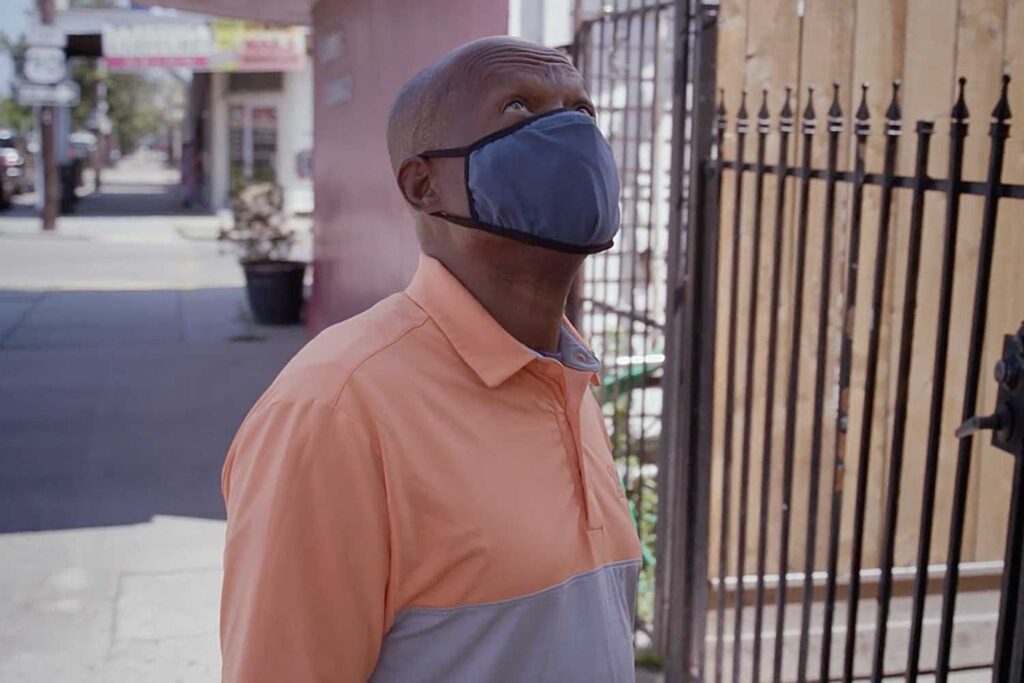NEED TO KNOW
A historical Black social club is getting candid about recent adversities.
Zulu Social Aid and Pleasure Club takes centerstage in the new documentary A King Like Me, which explores the challenges the first-ever Black Mardi Gras krewe faced during the COVID-19 pandemic. The New Orleans organization has existed for over 100 years, being officially established in September 1916, according to New Orleans and Company.
In the documentary, Terrence Rice, a Zulu member since 2014, returns to the Zulu building after the start of the pandemic in March 2020. “See that black flag up there,” he says, pointing towards the building. “Whenever the black flag is flying over the club, that means a member has passed away.”
While wearing a protective face mask, he greets a fellow member who pulls up to the building in a car. “I heard we lost 15 brothers to COVID,” longtime member Alvin Reed says.
The high number comes as shock to Rice, who responds, “I thought it was 11. I didn’t know we got to 15. I stopped counting. It hurts bad.”
Reed replies: “I’ve never been around this much death before in my life.”
Netflix
Never miss a story — sign up for PEOPLE’s free daily newsletter to stay up-to-date on the best of what PEOPLE has to offer, from celebrity news to compelling human-interest stories.
Rice then enters the empty club, noting that the current scene is “heartbreaking because it’s always so full of life.”
“The last time the club was closed this long was [Hurricane] Katrina, and I never thought it would happen again,” he adds.
Rice, alongside member Rodney Mason Jr., examines a wall filled with portraits of Zulu kings—members of the organization who are elected into the position by members of the krewe. They arrive at a portrait of former king Larry Hammond, who was the king in 2005 when Hurricane Katrina devastated New Orleans, and the two emotionally reflect on his death during the pandemic.
“It hit me like a bag of rocks,” Rice says. “Really, I didn’t believe it. He was an older guy but he was in pretty good shape. I didn’t think it would take him out. It was shocking to me, to be honest.”
New Orleans banned parades during Mardi Gras in 2021 as a result of the spread of the virus. However, the organization had their sights set on bringing the festivals back the following year.
“COVID-19 really took a toll on this organization beyond what’s printed and known about in the media, and while I regret not being [able] to ride in Mardi Gras 2021, there was still so much uncertainty,” councilman and former king J. Hebert Banks, explains in the documentary. “Numbers were still high, the death rate across the country was high, and there was no indication that we were coming out any time soon.”
A King Like Me follows members of Zulu “as they work to bring the Zulu parade back to the streets for Mardi Gras Day 2022, in the face of a global pandemic, Hurricane Ida and the loss of members due to COVID and gun violence,” per a synopsis.
The documentary is directed by Matthew O. Henderson in his debut and produced, in part, by Fisher Stevens, Kevin Hart and Robin Roberts.
Michael DeMocker/Getty
Banks previously opened up to The New York Times about how the Zulu krewe, in particular, was vulnerable to the spread of COVID-19.
“Zulu is 800 men, predominantly Black,” he told the outlet. “Like all Black communities, we have a large contingent of people who have pre-existing conditions. Our members come from all walks of life, and many of them don’t have jobs with sick days and don’t have the luxury of working at home. When you add these factors to a disease that capitalizes on these kind of circumstances, you get a perfect storm.”
Ultimately, the social club brought back its parade for Mardi Gras in 2022. The return included its signature adjacent festivities, including a king election and a coronation, said to be “the biggest black-tie event on the planet.”
A King Like Me is now streaming on Netflix.

